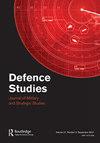Resilience to cyber-enabled foreign interference: citizen understanding and threat perceptions
Q1 Arts and Humanities
引用次数: 0
Abstract
ABSTRACT Cyber-enabled foreign interference remains a key threat to many advanced industrial countries. In many cases, the security response has been to build “resilience” – cyber, national and, increasingly, democratic resilience – in line with whole-of-government and whole-of-society strategies. However, many of these securitised responses are “top-down” and elite driven. These resilience agendas do not pay sufficient attention to the views, concerns and threat-perceptions of citizens, potentially undermining their efficacy. In this article, we focus on the Australian case to better understand how citizen cyber skills, threat awareness, and perceptions of institutional capacity can inform democratic resilience to evolving cyber and information risks. We find strong evidence of a clear gap between citizen views and the securitised responses of governments in dealing with cyber-enabled foreign interference. A further issue from the Australian case is that citizens are framed as a passive strategic resource, rather than conceived of as a potentially substantive partner in a “joined-up” response.对网络外国干涉的弹性:公民理解和威胁感知
网络外部干扰仍然是许多先进工业国家面临的主要威胁。在许多情况下,安全应对措施是建立“弹性”——网络、国家以及越来越多的民主弹性——与全政府和全社会战略相一致。然而,这些证券化的应对措施中有许多是“自上而下”的,由精英驱动的。这些韧性议程没有充分关注公民的观点、担忧和威胁感知,可能会削弱其效力。在本文中,我们将重点关注澳大利亚的案例,以更好地理解公民的网络技能、威胁意识和对机构能力的看法如何为民主抵御不断变化的网络和信息风险提供信息。我们发现强有力的证据表明,在处理网络外国干预方面,公民观点与政府的证券化反应之间存在明显差距。澳大利亚案例的另一个问题是,公民被视为被动的战略资源,而不是被视为“联合”应对行动中潜在的实质性合作伙伴。
本文章由计算机程序翻译,如有差异,请以英文原文为准。
求助全文
约1分钟内获得全文
求助全文

 求助内容:
求助内容: 应助结果提醒方式:
应助结果提醒方式:


